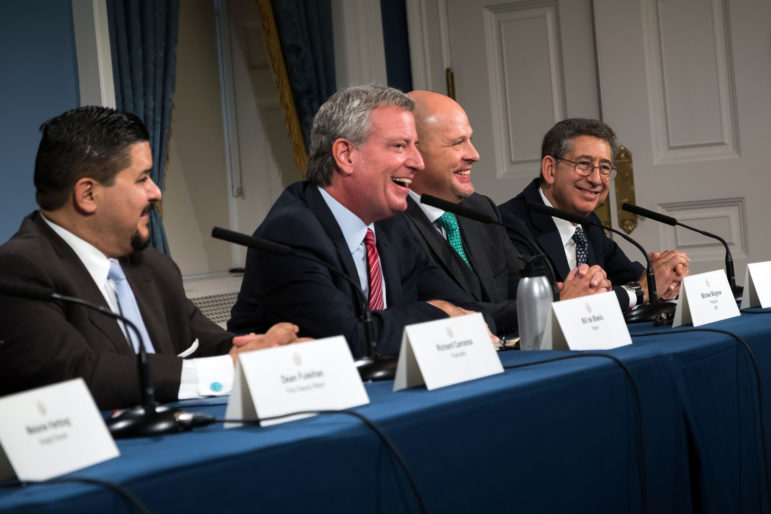
Mayoral Photography Office
Chancellor Richard Carranza, Mayor de Blasio, UFT head Michael Mulgrew and chief labor negotiator Bob Linn announce the tentative contact deal.
This CityViews op-ed generated two responses: “New UFT Contract Will Ease Excesses of DOE’s Evaluation System” and “UFT Defends its New Contract Deal with De Blasio”.
On October 11, the City and the United Federation of Teachers (UFT) announced a tentative 43-month contract deal, the last of Bill de Blasio’s administration. The union’s Delegate Assembly approved the contract at a precipitously called special meeting the next day, sending the contract to the full membership for final ratification. The voting membership* will likely rubber stamp the leadership’s proposal by the October 31st deadline.
This rush to complete the approval process gives little time to deliberate over the contract’s myriad terms, contained in a small print 63-page Memorandum of Agreement. Among the provisions highlighted by the city in its contract announcement are a “Bronx Plan” featuring differential pay plan for hard-to-staff positions in 180 historically underserved schools, new teacher leadership positions, course-specific stipends for post-Master’s level professional development, a distance learning initiative, pay raises consistent with the City’s pattern bargaining with other unions, and health care savings. A new pre-screening initiative “will determine prospective teachers’ suitability to teach.”
In a separate announcement, UFT President Michael Mulgrew touted many of the same terms along with bonuses and increased due process rights for paraprofessionals. Also paraded were new school safety and other expanded consultative powers, some tied to 120 Bronx Plan schools under a new “Collaborative School Model.” Mulgrew also lauded expedited class size complaint procedures.
Swift opposition came from at least one quarter, the UFT’s dissident Movement of Rank and File Educators (MORE), which criticized the pay package as not matching the inflation rate, failing to actually reduce class sizes, continuing extended time and parent/teacher conference hours deemed “a huge giveback” in previous contracts, and “eroded” health benefits.
Indeed, it’s hard to understand what the union was thinking in negotiating the new deal. After Janus v. AFSCME, where the U.S. Supreme Court barred compulsory public union agency fees for non-member employees, it was important for the UFT – a national symbol of public unions’ strength – to demonstrate its worth so that dues-paying membership would be promoted. Instead, President Mulgrew posed for a back-slapping photo-op with the Mayor and Schools Chancellor Richard Carranza, who called Mulgrew his “brother from another mother.”
At almost every turn, the contract benefits the Department of Education and does little to improve the lot of the vast majority of union members. Salaries are at best stable with raises unlikely to meet increases in the cost of living. More importantly, the city undercut a decades-long union policy that, except for seniority and educational attainment, would not allow the DOE to pay some teachers more than others. Under the Bronx Plan, STEM teachers in certain schools will make more than their citywide colleagues. It is hard to imagine the rank-and-file submitting to such inequity, undermining the very idea of union solidarity. As detailed in a recent City Limits story, teacher supply varies enormously. Are elementary school teachers to be paid less than high school teachers? Will science teachers be paid more than those in the arts and humanities? Will teachers in Harlem, an area of high teacher turnover, be paid more than those in Staten Island, the district with lowest attrition? What was Mulgrew thinking?
Provisions like expedited class size protocols and greater consultation roles do little to improve the day-to-day lot of teachers. Most won’t even notice these changes. And even new teacher leader positions help just a few. Increased distance learning poses an existential threat to teacher jobs and is of dubious instructional worth. Course-specific professional development stipends may target the DOE’s instructional needs but limit teachers’ choice. The contract continues to protect educators in the Absent Teacher Reserve (ATR) pool, those who lost jobs as a result of school closures and the like, but these are an infinitesimal segment of its 185,000 members. What was Mulgrew thinking?
Pre-service screening, a peculiar term to even include in the contract since it doesn’t affect union members, is entirely vague and a little scary. Though calling it “a solid contract,” Daily News warned, “if poorly executed, the suitability test could wrap an already complex hiring process in ever more red tape — or even exclude talented people who might do great work for a few years, then switch gears to another profession.” What was Mulgrew thinking?
Maybe, as argued by Ed in the Apple, we’re entering into a new era of mutually beneficial labor-management collaboration. Maybe there is more to the agreement than meets the letter of the contract, putting the UFT even closer within the Chancellor’s and Mayor’s embrace to teachers’ unseen advantage. Maybe, given the union’s impenetrable governance structure, the leadership got lazy since its power is secured by Byzantine rules that would be the envy of even the city’s almost-impregnable political machines. Maybe it’s the best deal the union could get.
But in this post-Janus era, the proposed contract doesn’t make the case for paid up union membership. That was Mulgrew’s challenge – perhaps as a leading progressive, the Mayor’s challenge, too—and that was a missed opportunity.
David C. Bloomfield is Professor of Education Leadership, Law & Policy at Brooklyn College and The CUNY Graduate Center. He is the author of American Public Education Law (3rd Edition) and other work
*: Correction: The initial version of this op-ed contained an erroneous reference to retirees voting on the contract.









2 thoughts on “CityViews: New Teachers’ Contract is a Missed Opportunity”
It’s over…too little on negotiations as well too late for this UFT membership to sit by and wait for the photo opt to be done..Democrats here in this city are weighing in with a large majority of new incumbents and give free reins to city to dictate their dying schools as well now all membership will be seeking new leadership. It’s what we pay for..always a few more grains and Pat you in the back..Paraprofessionals have been blattenly over looked again. That’s because teachers got all due back to them..anything else coming to them..they still were collecting into their annuities!?! It just goes to show…don’t look a gift course in the face..well they did..perhaps they just couldn’t get weight if all that retro quick enough to really look at another new contract …soooo pitifull!
The”Bronx Plan” is a reincarnation of a plan from the 1980’s. During that time, teachers who worked in schools known as “600 schools” were given “battle pay”, an extra “bonus”. The pay was challenged and later rescinded. The best part: teachers who had already received it had to pay it back!